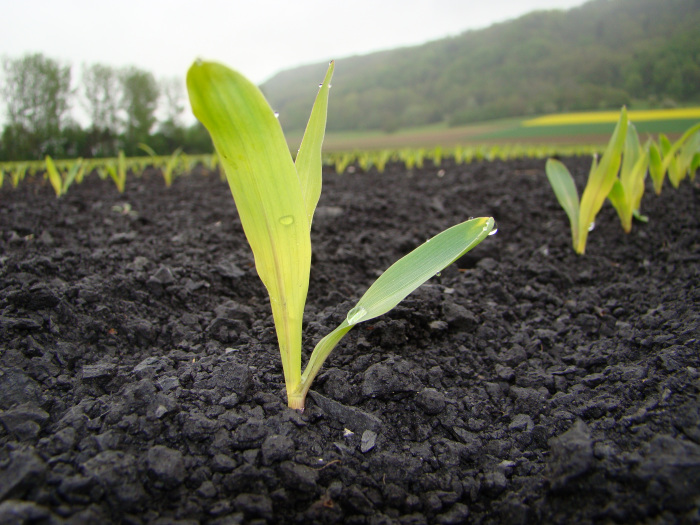
The Ganhe demo-farm project, a pilot initiative between the agriculture ministries of China and Germany, marks a successful run with a first-ever meeting for the press convened to highlight the project's results and achievements, as well as new developments in 2010. Held at the Beijing Landmark Convention Centre on April 9 2010 the conference has been organized by DLG AgroTechService in cooperation with AFC Consultants International, the joint demo-farm project team of implementing companies. The press conference was attended by 28 members of the media in China, and over 50 delegates from both the Chinese and German agriculture divisions and representatives from the demo-farm project. Speakers included Klaus J. Supp, counsellor of Food, Agriculture and Consumer Protection, Embassy of Germany in Beijing; Wang Bo, China's project manager of the Sino-German demo farm; Dr. Wolfgang Fock, manager of the Export Department, Lemken; Horst Bunge, German project manager of the German-Chinese Demonstration Farm. Present at the conference were Liu Min, head of the Chinese Ministry of Agriculture's Agriculture Machinery Testing Centre, local state agricultural cooperatives in China as well as research bodies, scientific institutions and the agricultural business community. Hailing the pioneering project as "hugely successful", Wang Bo, China's project manager of the Sino-German demo farm says: "Our first demo farm project in China has given farming experts from both sides a wonderful opportunity to interact and share a wealth of information which no doubt, will contribute to the administrative and scientific expertise of similar projects in the near future. Both parties have come away with a deeper appreciation of the challenges and corresponding farming practices relevant to conditions in Ganhe as well as Germany." The project marks a first step in the right direction for Sino-German agriculture exchange, says Horst Bunge, German project manager of the demo farm: "By joining hands in Ganhe and working closely together, we have understood each other better. Our aim is to develop the Ganhe farm as a best practice for an efficient farm using up-to-date and appropriate technologies." Elaborating, Bunge explained that key data collected will be used to analyze the exact results achieved as a measure of the project's success. During the implementation stage of the demo farm in 2009, both the Chinese and German teams had laid out their expectations, shared mutual experiences and established issues related to management and other topics. Training was conducted on tractor and equipment operations and all feedback gathered will be used for future projects. The 2.5-million-Euro demo farm, located in China's north-eastern Inner Mongolia Autonomous Region, is a landmark bilateral venture between the Chinese Ministry of Agriculture, and the Federal Ministry of Food, Agriculture and Consumer Protection in Germany. A Sino-German agriculture cooperative framework, which began in 2008, culminated into an agreement for the joint demo farm project in July 2009, which was then signed into action by China's vice minister for agriculture Niu Dun, and German parliamentary state secretary for agriculture, Dr. Gerd Müller. As part of the agreement, Germany was to provide the equipment, technical expertise and business management skills designed to enhance agriculture productivity on the Ganhe farm site. Training and skills transfer are also key to this partnership. An agriculture extension service was set up in October 2009, offering training in technical skills and sustainable farming practices. China's part was to provide the physical infrastructure and all input requirements needed to run the farm. A total of 16 sets of farm equipment and machinery worth €880,000 were transported from Germany to the 1000-hectare arable site in Ganhe. Contributions from partnering companies included tractors and combine harvesters from Claas; soil preparation, planting and spraying equipment from Lemken; sowing and tilling machinery, mechanical transplanter and potato harvester from Grimme; fertilizer machinery from Rauch; and pneumatic sowing machinery from Monosem. The project's initiatives have also included soil and water conservation and efforts to reduce reliance on fertilizers and crop protection products. This year, both sides will continue to build on the foundation of their first success, says Bunge: "For 2010, our goals are to further develop the management capabilities of both the German and Chinese teams. Our aim is to optimise the production technology for soya, summer wheat and potatoes, and deploy appropriate strategies from seed to harvest. We will continue to measure our success through the use of business analysis and develop a thorough training curriculum for our experts and apprentices. Modernisation of agriculture has been a focal point in Chinese politics in recent years. The country has embarked on an extensive development programme to modernise the typical small farm as well as larger farms nationwide, with the goal of increasing crop yields and financial returns. Subsidies will continue to be an important tool in government policies to boost domestic agriculture development. Germany's edge in agricultural engineering and mechanical innovation makes it a complimentary partner to China's ambitions to develop a world-class agriculture sector. At the same time, the Chinese farming sector, which is taking off on the back of government subsidies and support policies, offers German agri-machinery companies the chance to be at the forefront of business opportunities in one of the world's most lucrative and growing markets. Looking ahead, Germany will continue to share its technical expertise in agricultural engineering with China, with the view of forging a long-lasting and mutually beneficial partnership on both sides. German technology will also be constantly fine-tuned and adapted to better meet the needs of Chinese farms. More information on the demonstration farm is available at www.ganhedemofarm.cn
